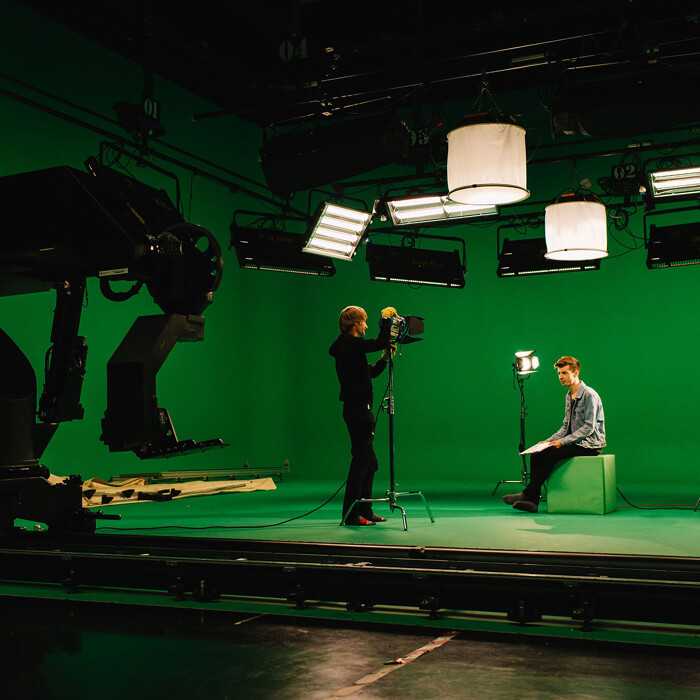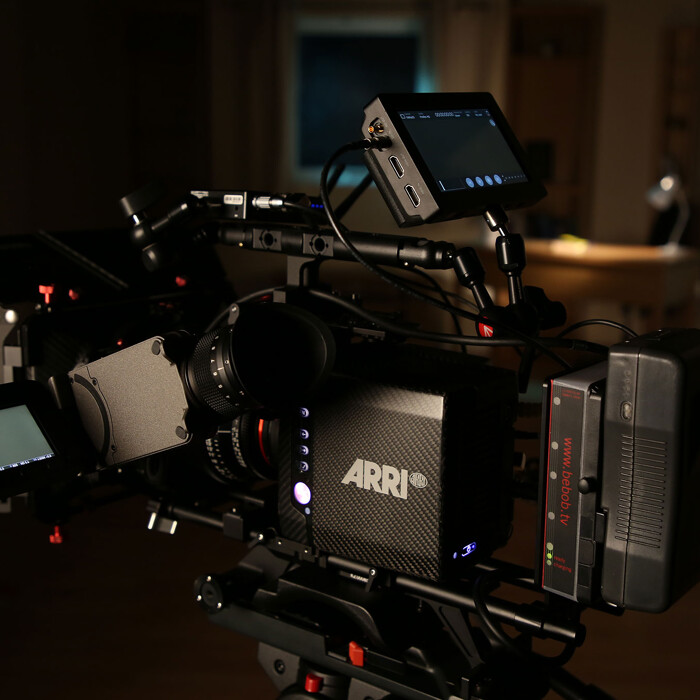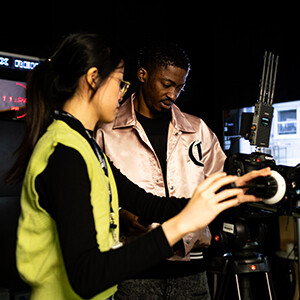
Digital Film Production with a Foundation Year - BSc (Hons)
Currently viewing course to start in 2025/26 Entry. Switch to 2026/27 Entry
September 2025 — UCAS code 1062
Are you interested in a career making films and videos? This Digital Film Production with a Foundation Year ensures you will develop a range of academic and technical skills relevant to technology in film. You’ll explore filmmaking fundamentals such narrative, composition and film theory to camera testing, designing digital production workflows and post-production....
48 points required
Calculate UCAS pointsClearing places available
- Level Foundation
- Study mode Full Time
- Award BSc (Hons)
- Start date September 2025
- Fees View course fees
- Subject
- Location City Centre
This course is:
Open to International Students
Overview
Clearing 2025
48 points (or equivalent) is the minimum you will need to be considered for this course in Clearing.
Use the UCAS Tariff Calculator to work out your points.
Are you interested in a career making films and videos? This Digital Film Production with a Foundation Year ensures you will develop a range of academic and technical skills relevant to technology in film. You’ll explore filmmaking fundamentals such narrative, composition and film theory to camera testing, designing digital production workflows and post-production. On this course, you’ll develop a broad range of technical and creative skills with the support of our cutting-edge facilities and software, including our four professional TV studios in The Parkside Building.
About the Foundation Year
The Foundation Year course option enables you to study for our BSc (Hons) degree over an extended full-time duration of four years by including a Foundation Certificate (year one of four). The Foundation Certificate provides a broad study programme that underpins the follow-on degree. To progress to the next year of your degree, it is necessary to achieve a pass in all of the modules of the Foundation Certificate.
What's covered in this course?
This Digital Film Production degree with foundation year focuses on fundamental technical concepts, including the physics of sound and light being captured during production (and the tools and approaches used to do this), as well as the techniques used to digitally store and manipulate both images and audio in post-production.
The course aims to produce well rounded filmmakers with a mix of technical, creative and business skills, able to work with digital video in a variety of industries. To achieve this, as well as its focus on the process and practice of producing films, the course covers a range of important subjects, such as visual composition, narrative design, production design, the film business and cross-platform productions.
This course is taught in the heart of Birmingham across our City Centre Campus which boasts an active and accessible film-making community. You will be studying on the same campus as undergraduates studying a range of arts, including acting, music, photography, fashion and theatre, which means that there will be lots of opportunity to collaborate with other students to develop your skills and build a portfolio of work.
You’ll also have opportunities to engage with industry, allowing a number of flexible paths to gaining work experience, including: basing selected modules around work experience, taking a placement year and working on commercial productions within the University.
Accredited By
This course is accredited by:
The course definitely helped me with so many aspects of film and video production. From creating budgets for jobs, to understanding the technical functions of various cameras, right through to delivery formats for the projects. I certainly came out with a larger skill base and experience in filmmaking.
Josh Birch
Why Choose Us?
- We’re ranked 1st in the UK for Film Production and Photography for two consecutive years (Guardian League Table 2025 and 2024).
- Facilities at STEAMhouse - Based at our expanding City Centre Campus, this unique state-of-the-art building gives you access to outstanding facilities and teaching spaces, as well as opportunities to collaborate with people and businesses across multiple sectors and work on real industry-based projects.
- Outstanding facilities - Our Centre for Digital Media Technology is equipped with over 1,200 sq m of facilities including two film/television studios, four multi-track recording studios, post-production suites, a BOLT JR+ high-speed camera robot, and several editing and grading stations.
- Knowledge of the fundamental aspects in film production - Explore the technology and physics of film production, from working with light and sound, to understanding how different production and post-production tools affect images and sound you capture.
- Highly employable graduates - Move quickly into key production roles with the combination of technical knowledge and practical production experience from your course. Our graduates have gone on to work at the BBC.
- Gain first-hand experience in industry - You will have the opportunity to network and make contacts with people in industry, gain work experience and to take a placement year between your second and final year.
Where our students go
Our students have gone on to work with companies such as:
- Ashfields
- Christopher Smith
- Creative Video
And in jobs such as:
- Film Production and Technology
- Film Maker
- Production Assistant
Open Days
Join us for an Open Day where you'll be able to learn about this course in detail, chat to students, explore our campus and tour accommodation.
Next Open Day: 4 October 2025
Entry Requirements
These entry requirements apply for entry in 2025/26.
All required qualifications/grades must have been achieved and evidenced at the earliest opportunity after accepting an offer to help confirm admission and allow for on-time enrolment. This can also include other requirements, like a fee status form and relevant documents. Applicants can track their application and outstanding information requests through their BCU mySRS account.
48 points (or equivalent) is the minimum you will need to be considered for this course in Clearing.
Use the UCAS Tariff Calculator to work out your points.
Essential requirements
80 UCAS Tariff points. Learn more about UCAS Tariff points.
If you have a qualification that is not listed, please contact us.
Fees & How to Apply
UK students
Annual and modular tuition fees shown are applicable to the first year of study. The University reserves the right to increase fees for subsequent years of study in line with increases in inflation (capped at 5%) or to reflect changes in Government funding policies or changes agreed by Parliament. View fees for continuing students.
Award: BSc (Hons)
Starting: Sep 2025
- Mode
- Duration
- Fees
- Full Time
- 4 years
- £9,535 in 2025/26
- Apply via Clearing
International students
Annual and modular tuition fees shown are applicable to the first year of study. The University reserves the right to increase fees for subsequent years of study in line with increases in inflation (capped at 5%) or to reflect changes in Government funding policies or changes agreed by Parliament. View fees for continuing students.
Award: BSc (Hons)
Starting: Sep 2025
- Mode
- Duration
- Fees
- Full Time
- 4 years
- £17,690 in 2025/26
Places available to start in September
If you'd like to start this course full-time this September, you can apply through Clearing.
International and part-time students can apply online as normal using the links above.
Want to start in September 2026? You can apply via UCAS from September 2025.
You are not required to submit a portfolio for this course.
Course in Depth
Foundation year
In order to complete this course you must successfully complete all the following CORE modules (totalling 120 credits):
This module will introduce you to the underlying principles required to understand media audiences. Audiences are diverse in their make-up and in their motivations for engaging with media. To explore this diversity you will learn a range of techniques for researching audience behaviour, such as survey work, focus groups and online ethnography. Alongside these methods you will explore key concepts to help you to interpret and understand this research data. You will engage with theories of identification and culture in order to understand audience motivations for engaging with media. You will explore the characteristics of audiences and learn how to identify their needs from a production perspective.
To complement this investigation, you will also examine other related concepts such as genres and understand how the wider media industry uses the category of audience to create, market and ultimately sell its products. You will learn how to use your research data to present an idea for a media product that will appeal to a particular media audience.
The purpose of this module is to assist you in developing the academic skills needed to succeed in higher education, and the professional skills required to support your ambitions to be a media worker. You will be introduced to the wide range of academic and practical support that the university offers.
Students will plan and produce a media artifact that will evidence their competence in media production to create a meaningful media artifact. The focus in this module is about understanding how image and sound is edited together to create meaningful narratives. In the module students will develop an idea and implement it as a short audio or video piece. Central to creating this piece is learning how to use relevant portable video and sound production equipment and software. The ability to effectively record and edit a variety of media formats using industry standard equipment software is a key skill to develop whilst at university. This module will introduce students to the practical basics of editing.
This module is focused on collaborative work in a media production context. Through a group production activity students will learn about media production hierarchies and how to behave within a team context in order to produce a successful outcome. The module will explore what makes for successful teamwork in the media. The module will further develop the understanding of media production practice.
Identifying and understanding the connections between media theory, culture, and production is an essential skill for students to develop. Understanding how these concepts and practises interlink is key to succeeding at university and working as effective media workers. This module will introduce basic research practise methods and media theory and will enable students to gain insights into the role these concepts play in underpinning media production and culture. The module offers an opportunity for you to explore theoretical concepts in your own practice.
The media project module will present students with the opportunity to consolidate their learning whilst on the Foundation Media course. Students will be invited to devise, plan, and deliver a practical piece of work focused on their area of media interest. Students will draw from their experience and knowledge gained from their engagement with the course and creativity that evidences their ability to produce effective media artifacts.
Year One
In order to complete this course a student must successfully complete all the following CORE modules (totalling 120 credits).
This module will develop understanding of key digital film production processes. You will be introduced to the tools of production, including sound recording equipment and video cameras. Through the application of a ‘flipped’ curriculum you will be encouraged to become an independent learner with an approach to production work that will be ‘hands on’ from the start. This creative and technical module is designed to provide you with the knowledge and skills to follow a path of further study in practical filmmaking.
This module will develop your skills, knowledge and experience of key techniques within visual design industry – more specifically the art and craft of visual communication, visual design and digital asset creation.
The competent use and application of these techniques are core practical skills within the course programme and fundamentally important to a variety of careers within the digital media industry.
This module will develop your understanding of audio visual acquisition technologies for digital film production. The module addresses how images and audio are captured using sound and video recording equipment in a film production environment. You will understand the physical properties of sound and light and how these impact on the technology and use of film capture equipment.
A great deal of film production takes place in dedicated studios or sound stages. This generally involves large teams of people working in departments within a specified hierarchy. This module introduces you to production in a controlled environment, covering both the studio equipment and working practices within a studio. You will gain practical experience through which you can familiarise yourself with the specific roles that different crew members play in the production process.
This module will introduce you to the technology, techniques and practical considerations involved in sound production for film and other visual media. The aim of the module is to familiarise you with the variety of possible procedures undertaken in the incorporation of sound with visuals to create a unified audio-visual experience.
This module will develop your understanding of audio visual technologies in production. The aim of this module is to provide you with the knowledge and appreciation of fundamental principles and practices of audio visual technology. You will explore the various technologies used to produce a film to a professional standard and gain a deeper understanding of the science of image and audio capture.
Year Two
In order to complete this course a student must successfully complete all the following CORE modules (totalling 120 credits).
Working as part of a team is the accepted modus operandi of film production, and gaining experience of the collaborative process is an invaluable asset that you can take into your professional career.
This module provides you with an understanding of the design and execution of a team production with particular focus on narrative drama. The module provides opportunities for intellectual and creative development through the application of technical knowledge, software systems and design principles to the creation of high quality digital film products.
This module investigates the process of screenwriting and provides opportunity for you to explore this process in preparation for your final year production. Furthermore, it contributes to development of the wider key skills required for employment, through in-class activities, assessments and background research.
The program on which this module is delivered combine the study and usage of audio visual technologies and content management systems utilized in the creation of a range of content which can be delivered to a variety of platforms. As the Film and Television industries have moved to file-based workflows, new roles and practices have come into existence to manage data in reliable and consistent ways, and ensure the safe replication, storage and migration of the ‘digital negative’. This vital link between production and post is currently filled by increasingly skilled and knowledgeable crew members, for whom the title Digital Image Technician has been officially recognised.
The module is an opportunity to learn and critically reflect on the skills of collaboration by enabling you to create an interdisciplinary project with students from complementary disciplines, or with academic staff. Collaboration is a vital employability skill within the Creative Industries and this module allows you to develop these skills, making use of University facilities and with the support of academic staff.
This Module focuses on the post production element of filmmaking. Specifically areas concerning editing techniques, compositing, audio finishing, colour correction and grading to aid narrative. You will learn both the technical skills of audio and video editing as well as the grammar and structure that belong to the art in order to become better storytellers.
This module will explore the fundamental concepts involved in conducting technical engineering research. It will explore the international standards and theories underpinning engineering testing and analysis. From this module you will gain knowledge to distinguish and appraise technology and understand current technical limitations, thus underpinning studies for your final year technology project and enhancing your routes into technical employment.
Professional Placement Year (optional)
In order to qualify for the award of Bachelor of Science with Honours Digital Film Production with Foundation Year and Professional Placement Year, a student must successfully complete all of the modules listed as well as the following Level 5 module:
This module is designed to provide you with the opportunity to undertake a credit bearing, 40-week Professional Placement as an integral part of your Undergraduate Degree.
The purpose of the Professional Placement is to improve your employability skills which will, through the placement experience, allow you to evidence your professional skills, attitudes and behaviours at the point of entry to the postgraduate job market. Furthermore, by completing the Professional Placement, you will be able to develop and enhance your understanding of the professional work environment, relevant to your chosen field of study, and reflect critically on your own professional skills development within the workplace.
Final year
In order to complete this course a student must successfully complete all the following CORE modules (totalling 120 credits).
Working in the wider community of production, it is important to consider your part in the overall creation of an artefact. Being able to work independently; demonstrating problem solving skills; identifying and improving your own performance and; working other team members, are all traits that will be demanded of you in a typical work-place setting.
The purpose of the module is to enable you to undertake a sustained, in-depth and research informed project exploring an area that is of personal interest to you. In agreement with your supervisor, you will decide upon your topic which will take the form of a practical outcome (artefact) with accompanying contextual material. The main consideration when choosing your topic is that it must be aligned to the programme you are studying, and you should consider the relevance of this topic to your future academic or professional development.
At this level, you will be expected to work independently but you will receive additional one-to-one support from your supervisor, who will be familiar with your chosen topic area. As you progress on the module, extra support will be available and this may take the form of group seminars, workshops and online materials that will help to develop your project.
Download course specification
Download nowAttendance requirements
For more information on attendance requirements, course contact time and suggested self-study hours, download the course specification.
Student stories
 Josh Birch
Josh Birch
When Josh Birch enrolled on a BSc (Hons) Film Production Technology course, he wasn’t sure of where the career path would take him. A year on after graduating, he has worked around the world and done some incredible filming.

Athena Swan Bronze Award
We have successfully secured the Athena SWAN Departmental Bronze Award recognising a commitment to gender equality.
The Athena Swan Charter is a framework which is used across the globe to support and transform gender equality within higher education (HE) and research.
Employability
Enhancing employability skills
Engaging with industry and gaining work experience during your studies is essential if you are going to be taken seriously in the job market. Getting work experience in film production can be challenging, so we encourage you to be agile and help you engage with a board range of opportunities available.
The University is eager to recognise students who have made the effort to gain industry experience and stand out from the typical graduate, and thus it offers a range options for you to get extra awards and recognition for your work in industry.
You have the option undertake an assessed sandwich year between your second and third year, which will provide you with valuable work experience and give you the real-life skills you need.
The second-year Collaborative Practice and final-year Production Project modules have been designed so that you can use your work in industry as a basis for the module’s assessment.
The university has a Graduate+ programme, an extracurricular awards framework that is designed to augment the subject-based skills that you’ve developed throughout the programme with broader employability attributes, which will enhance your employability options upon graduating.
Placements
There are a range of opportunities for student to gain industry experience, examples of activities our student have done include:
- Working as a runner on one of our commercial productions
- Working for crewing agencies
- Working part-time for a production company
- Doing a placement year between the second and third year of the course
- Submitting work to crowdsourcing competitions and film festivals
- Collaborating with other students and local film makers on productions
- Setting up a YouTube channel
- Working directly for clients
- Organising and running events.
Facilities & Staff

Our Facilities
The course is supported with cutting-edge facilities, including the University’s Parkside Media Centre, which is equipped with over 1,200 sq m of dedicated equipment, including three film/television studios, dedicated green screen studio, post-production facilities, BOLT JR+ high-speed camera robot, multi-track recording studios, and several editing and grading stations.
You have access to the industry standard software used on the course such as Adobe Creative Cloud, Final Cut Pro, AVID and Logic. Most of these tools are also available in our dedicated open access areas and our library which is open 24 hours a day. Laptops can also be hired out used in other spaces within the University.
Cameras, light and grip equipment can be hired for free from our hires and loans team. Equipment available includes: 4K cameras, high-end HD cinema style cameras with follow focus and matte boxes, a range of DSLR cameras, a range of different lights, soft boxes, flags, reflectors, a range of different tripods, stands, dollies, steady cams and jib arms.
Within the Centre there is an internationally recognised research team, DMT labs, specialising in mixed reality, intelligent animation, automated grading and compositing and human perception. This research team is involved in the delivery of this course, providing opportunities to join them as a post-graduate researcher on completion of the course.
Our staff
Mathew Randall
Senior Lecturer
Dr Mathew Randall is a Senior Lecturer at Birmingham City University in the UK, where he lectures in visual effects and computer graphics. He is a member of the Graphics and Vision Research group, specializing in real-time analysis and manipulation of motion captured performances and applications of virtual production technology. He is a senior...
More about MathewJay Patel
Senior Lecturer
Jay has been involved with the delivery of ERDF projects. Since the successful completion of these projects he has moved into teaching. He currently delivers a variety of modules such as Audio Visual Technology, Moving Image Technology and Mathematics for Media.
More about Jay




